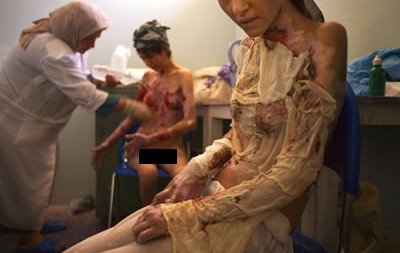By George Thomas
KABUL, Afghanistan -- Every day in Afghanistan, women are committing suicide by setting themselves on fire. In a country where women are often oppressed, self immolation has become a common practice to escape family problems. And the cases of self immolation are growing at an alarming rate.
[utube]AN4tyj6eHx8[/utube]The Smell Is Unbearable
Some 400 miles from Kabul, in the Western Afghan city of Herat, the local hospital's burn unit is struggling to help the dying. The smell of charred human flesh is unbearable. The screams of pain are unending. Most here don't live to see another day.
"They burn themselves because they see no other option," said Dr. Zakia Fazel, an Afghan human rights advocate.
Setting oneself on fire is the preferred method of suicide for many Afghan women, especially in Herat.
"Sure, life has gotten a little better since the days of the Taliban," said Fazel. "But the conditions for women haven't changed. They still suffer, and in some cases it is getting worse for them."
Forced Marriages
The majority of the victims are girls and women who are forced into marriages.
Sixty percent of Afghan girls are married before the legal age of 16. And between 70 and 80 percent must endure forced marriages. Often, the marriage is to an older man who has another wife and children.
Setting themselves on fire has become a form of protest.
"Most of these women are beaten and abused," said Fazel. "If they run away, they are eventually caught and sent back to their families and no one seems to care what happens to them after that."
Aid workers and human rights groups say that social, cultural as well as religious restrictions often prevent Afghan women from getting the help they so desperately need.
"And so the numbers of those committing suicide in this way are increasing, not just in places like Herat, but all across Afghanistan," Fazel explained.
'I Wanted To Die'
Twenty-one-year-old Fazela Imad is one of the lucky ones who survived her suicide attempt.
"I wanted to die but God decided it was not my time. So now I have to live with my scars," said Imad.
Five years ago Fazela was engaged to marry her first cousin at the family's bidding. She refused and doused herself with fuel and set herself afire.
"I still remember it like it was yesterday," Fazel told CBN News as she struggled to recall the events of that day. "I wake up everyday and see myself in the mirror and wish things were different."
Making a Difference
She and other survivors are trying to make a difference. They occasionally travel around the country holding seminars and workshops on women's rights.
But it's not easy. Fazel said Afghan women who defy traditional gender roles and speak out against abuse are routinely threatened or killed.
"One of the biggest challenges is to change the way men view us in the Afghan society, this is still a very patriarchal society," Fazel said.
Taliban Comeback
Afghanistan's constitution gives equal rights to men and women. But despite an increase in the number of girls in school, most Afghan women - especially in rural areas - still lack full rights to work and education.
Hundreds of schools and students have been attacked this year by Islamic militants who oppose advancements for women's rights.
More than six years after the fall of the Taliban regime, the radical extremist group is making a strong comeback.
And as Taliban strengthen their hold on parts of the country, the future for women in much of Afghanistan looks bleaker.




